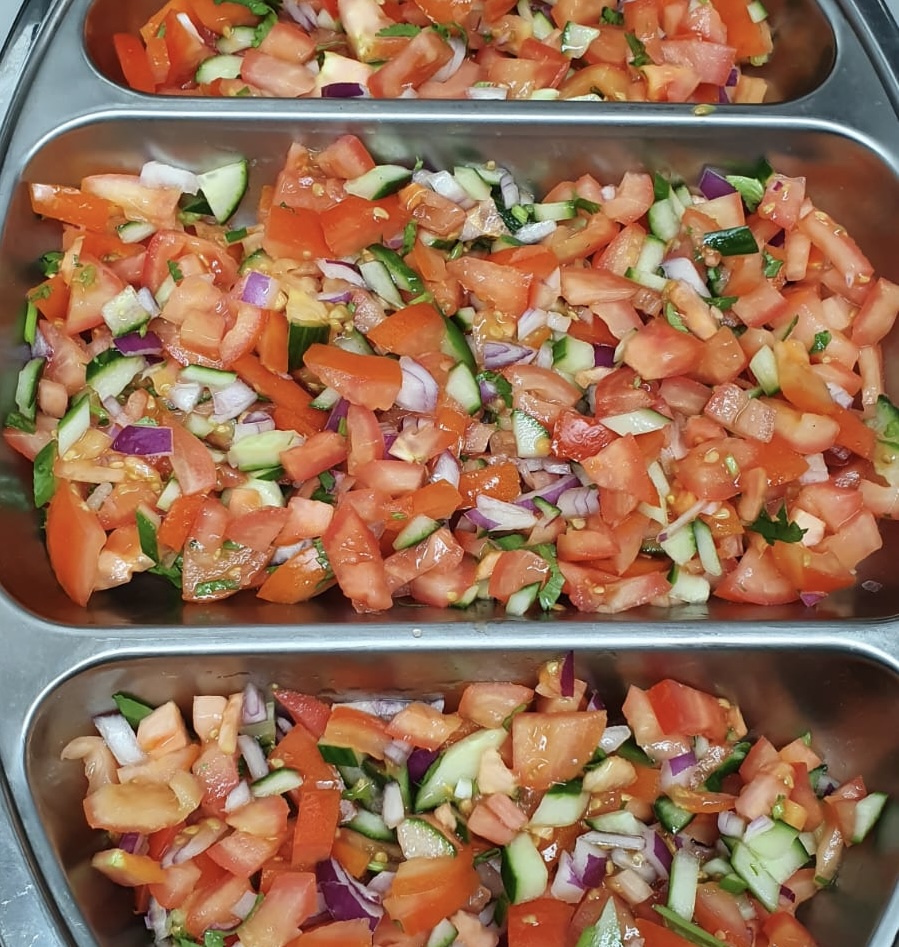News
Kachumbari Behind Rising Cases of H. Pylori Causing Peptic Ulcers, Doctors Now Warn
Doctors warn that the very nature of kachumbari—raw and often prepared in unsanitary conditions—makes it a breeding ground for harmful bacteria, including H. pylori.

Kachumbari, the beloved Kenyan salsa made from raw tomatoes, onions, lemon juice, and salt, has long been a staple of street food culture. However, its rising popularity is now being linked to an alarming increase in cases of Helicobacter pylori (H. pylori) infections, which cause peptic ulcers, according to medical experts.
The dish, often served alongside kebabs, mutura, smokies, boiled eggs, and chapatis, is a favorite among Kenyans for its fresh, tangy flavor.
Yet, doctors warn that the very nature of kachumbari—raw and often prepared in unsanitary conditions—makes it a breeding ground for harmful bacteria, including H. pylori.
The Hidden Dangers of Street Food
Dr. Ajua Nkeng Alemanji, a gastroenterologist at Nairobi’s Gastro Hub Clinic, explains that the raw ingredients in kachumbari are particularly vulnerable to contamination. “Once the tomatoes, onions, and cilantro are chopped and served, it’s impossible to clean them. Even if the vendor tries to wash the vegetables, contaminated water can render the effort useless,” he says.
Street vendors, who often lack access to clean water and proper kitchen equipment, are at the heart of the problem. Many handle food with unwashed hands or reuse soiled gloves, increasing the risk of spreading bacteria. Some vendors admit to reusing water for washing vegetables multiple times due to scarcity, further compounding the issue.
Hassan Ibrahim, a kachumbari vendor in Nairobi’s Central Business District, says he prepares the dish by hand to meet customer demand for freshness. “I buy very ripe tomatoes because they’re juicier and easier to cut. Customers love it,” he says. However, Hassan acknowledges that he relies on a 20-liter water container for washing ingredients, changing the water only twice a day.
A Growing Public Health Concern
H. pylori is a bacteria that infects the stomach lining, leading to peptic ulcers, gastritis, and, in severe cases, stomach cancer. The infection is primarily spread through contaminated food and water, making street food a significant vector. Dr. Alemanji notes that the risk is heightened in urban areas where street food is a dietary staple.
“The inherent risk is the possibility of contracting foodborne diseases such as cholera, amoebiasis, and typhoid. H. pylori is a common disease that you can pick up from eating street food, especially when proper hygiene is not observed,” he explains.
MaryAnne Wanza, a registered nutritionist and dietitian, echoes these concerns, highlighting the dangers of improper food handling. “I’ve seen patients develop serious gastrointestinal issues after eating contaminated kachumbari,” she says. “The utensils, cutting surfaces, and even the hands of the person preparing the food all contribute to the overall safety of the dish.”
A Call for Government Intervention
While consumers are advised to exercise caution when choosing where to eat, Dr. Alemanji emphasizes that the responsibility for ensuring food safety lies largely with the government and public health systems. “It’s difficult for the average person to mitigate the risks of street foodborne diseases. The responsibility falls on county health and public health officials to regularly inspect street food vendors and ensure they are adhering to sanitary standards,” he says.
However, many vendors operate without permits or formal training in food safety. Training programs on handwashing and proper food handling could significantly reduce the spread of not only H. pylori but also other pathogens like hepatitis A and Staphylococcus aureus.
What To Do
For those who can’t resist the allure of kachumbari, Dr. Alemanji offers practical advice: “Look at the environment where the food is being prepared. If you’re buying kachumbari from a vendor near a sewer line or a garbage dump, that’s an obvious red flag.”
He also recommends opting for whole fruits and vegetables that can be washed or peeled at home rather than pre-sliced or pre-prepared items. “If you’re buying an apple, orange, or mango, it’s safer because you can take it home, wash it properly, and then eat it. But with pre-sliced foods like kachumbari, the damage is already done if the vegetables were not washed properly,” he says.
Balancing Taste and Safety
Despite the health risks, kachumbari remains a cultural and culinary favorite. Its nutritional benefits, such as the lycopene found in tomatoes, which reduces the risk of heart disease and certain cancers, are undeniable. However, as Dr. Alemanji points out, “If you’ve already had your fill of vegetables for the day, the small portion in kachumbari won’t make much of a difference.”
As the popularity of street food continues to grow, so too does the need for stricter hygiene standards and public awareness. Until then, Kenyans may need to think twice before indulging in their favorite tangy treat.
Kenya Insights allows guest blogging, if you want to be published on Kenya’s most authoritative and accurate blog, have an expose, news TIPS, story angles, human interest stories, drop us an email on [email protected] or via Telegram
-

 News2 weeks ago
News2 weeks agoTHE FIRM IN THE DOCK: How Kaplan and Stratton Became the Most Scrutinised Law Firm in Kenya
-

 Economy2 weeks ago
Economy2 weeks agoIran Demands Arrest, Prosecution Of Kenya’s Cup of Joe Director Director Over Sh2.6 Billion Tea Fraud
-

 Grapevine1 week ago
Grapevine1 week agoA UN Director Based in Nairobi Was Deep in an Intimate Friendship With Epstein — He Even Sent Her a Sex Toy
-

 Business2 weeks ago
Business2 weeks agoKPC IPO Set To Flop Ahead Of Deadline, Here’s The Experts’ Take
-

 Politics2 weeks ago
Politics2 weeks agoPresident Ruto and Uhuru Reportedly Gets In A Heated Argument In A Closed-Door Meeting With Ethiopian PM Abiy Ahmed
-

 Investigations1 week ago
Investigations1 week agoHow Mexico Drug Lord’s Girlfriend Gave Him Away
-

 Business2 weeks ago
Business2 weeks agoSafaricom Faces Avalanche of Lawsuits Over Data Privacy as Acquitted Student Demands Sh200mn Compensation in 48 Hours
-

 Investigations2 weeks ago
Investigations2 weeks agoKenya’s DCI Opens Probe on Russian Man Who Secretly Filmed Sex Escapades With Women — But There’s a Slim Chance They’ll Ever Get Him



















